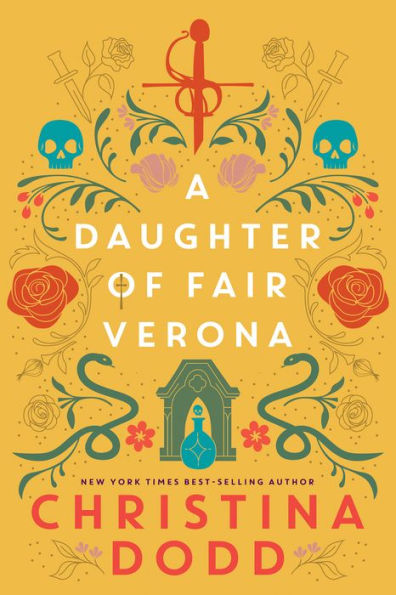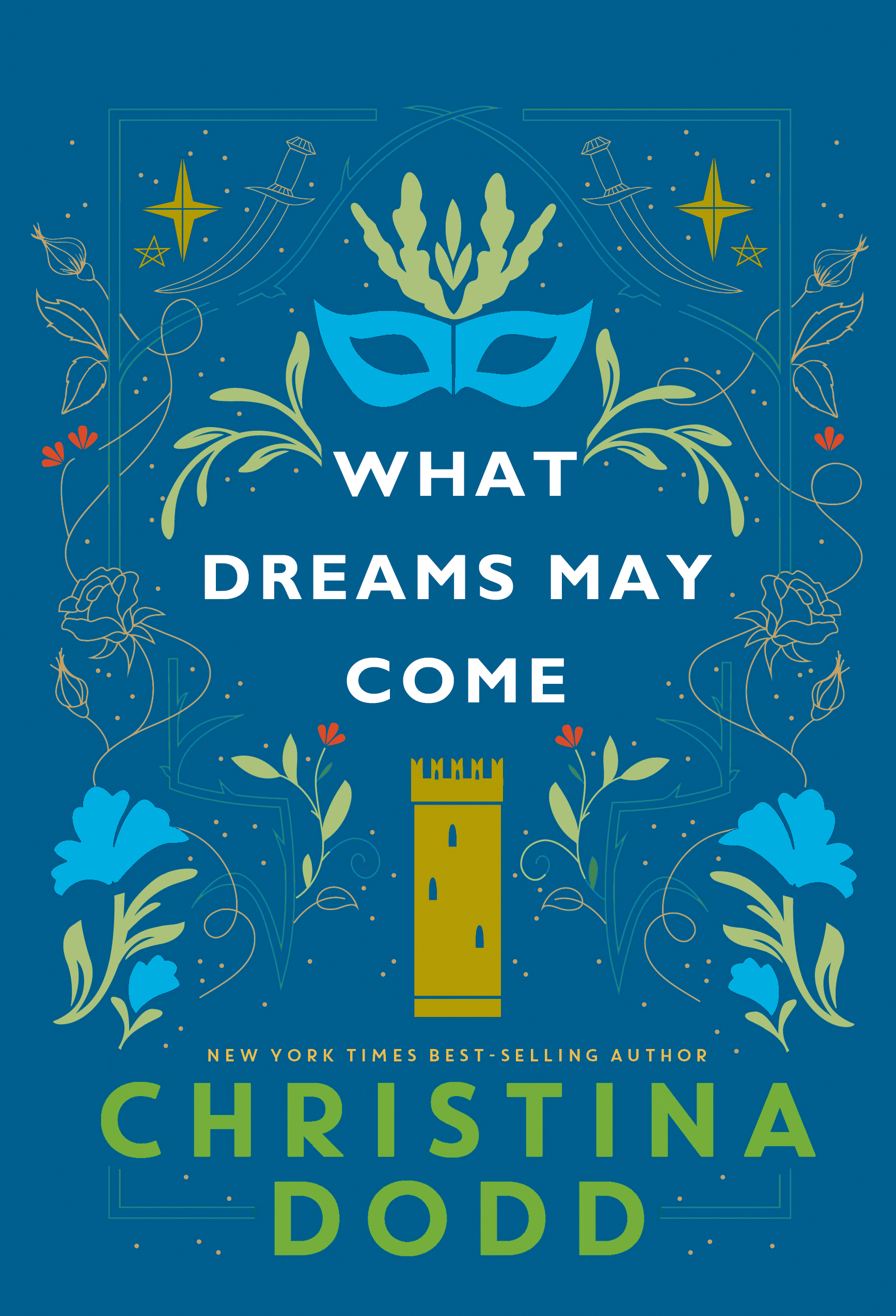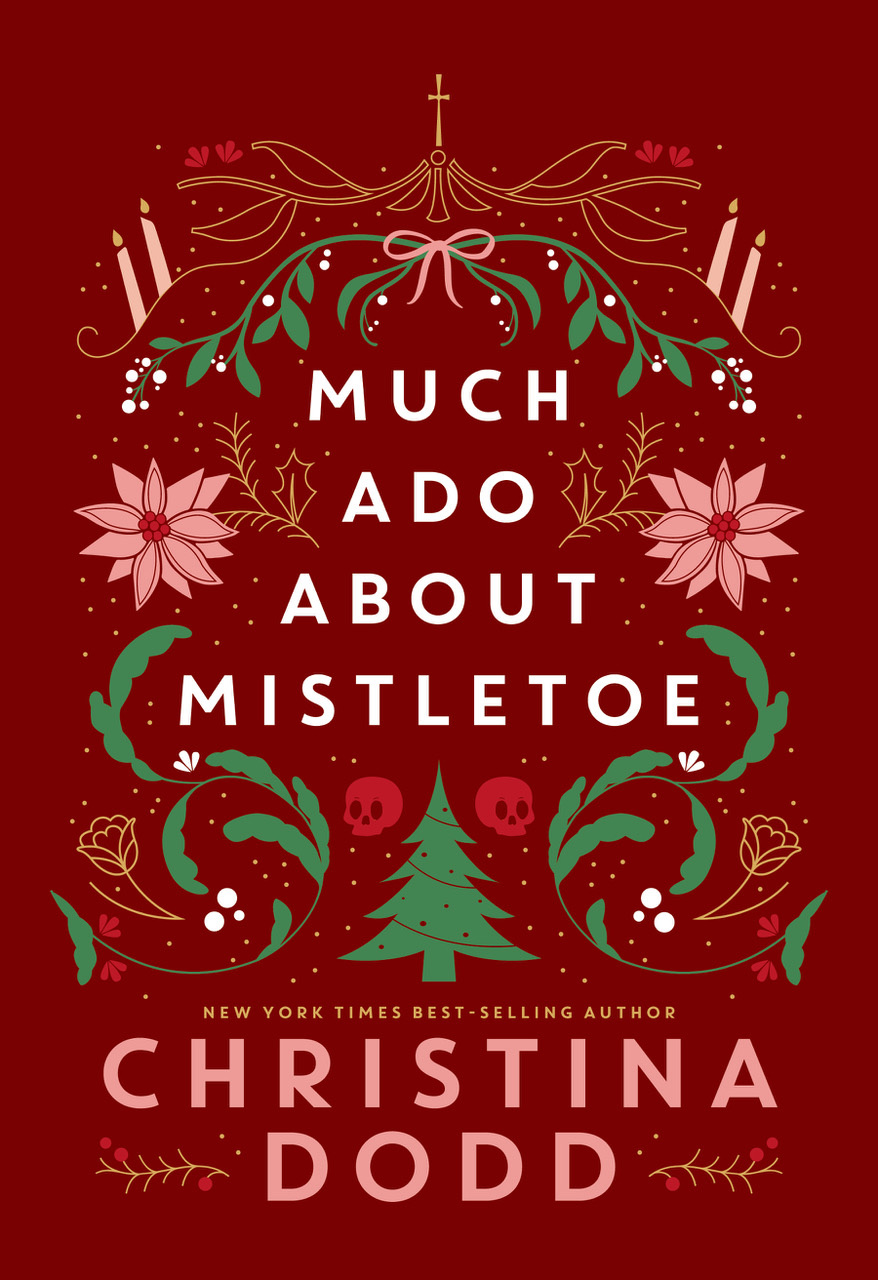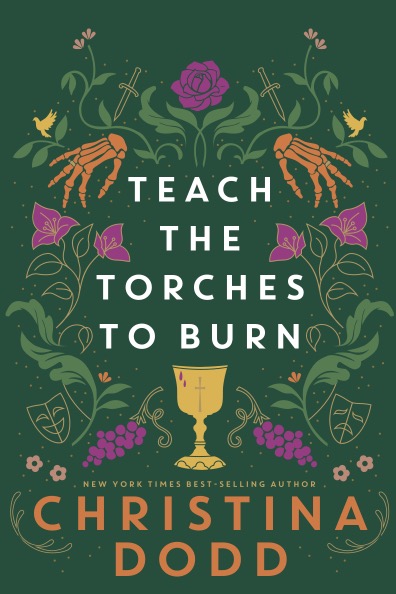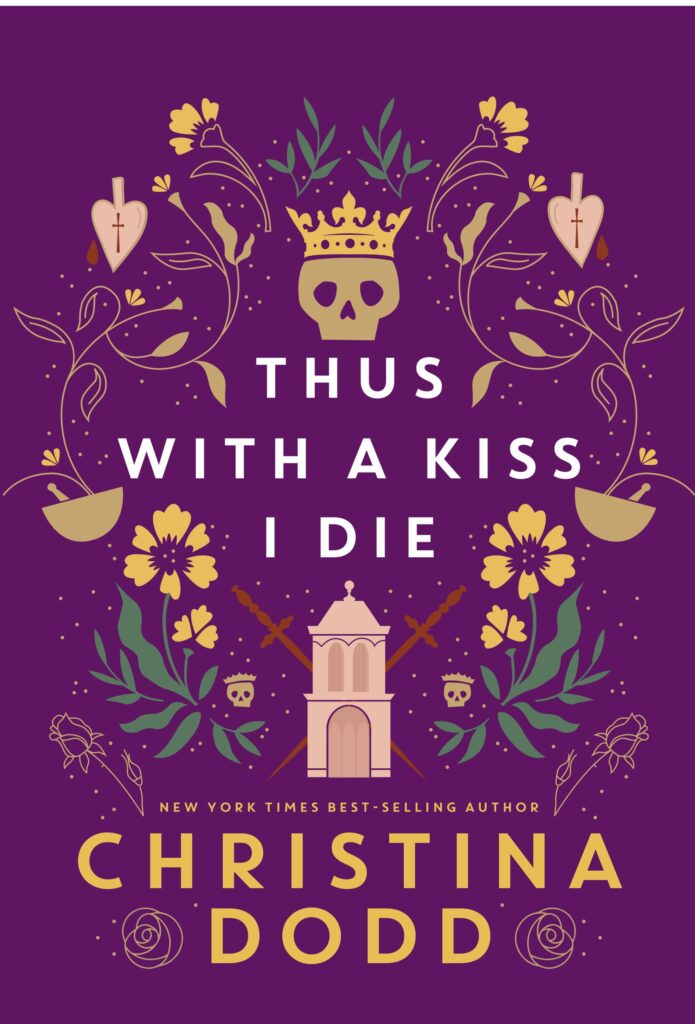
Daughter of Montague #2
June 24, 2025
Kensington Publishers (A John Scognamiglio Book)
ISBN-10: 1496750195
ISBN-13: 9781496750198
Available in: Hardcover, Audio, e-Book
BUY NOW
Hardcover
Barnes & Noble
Bookshop
Books-A-Million
eBook
Barnes & Noble
Kobo
Google Play
Apple Books
Indigo
Audio
Audible
Amazon Audible
Chirp
Libro
Barnes & Noble
Kobo
More Buying Options
Katy
Powell's
Indigo
Goodreads
Poisoned Pen
Thus With a Kiss I Die
The delightfully irreverent eldest daughter of the not-so-ill-fated Romeo and Juliet returns to sleuth another day in fair Verona, in this hugely entertaining historical mystery series with a refreshingly bold premise. (Think Hamlet!)
“Woe, for I am the bug that meets the windshield’s might,
No longer the speeding glass, smooth, clean and bright . . .”
You’re right. I, Rosie Montague of Verona, am lousy at iambic pentameter and Shakespeare speak, but you get the point: Sometimes you’re the windshield and sometimes you’re the bug. I, who for my whole life, have cruised along, unruffled by life’s trials, am suddenly smashed flat and speeding up the WhattheHellHappened Highway.
Why? you ask . . .
I’m 20-years-old and by my own design, never been wed, free as no married woman ever is. I’m beautiful, but without conceit, for Juliet, my legendary Mamma is the most gorgeous creature to ever walk the earth. Just ask Romeo, my legendary Papà. (Rumors of their deaths were premature.) I was heartwhole until I fell (literally) in love with Lysander of the House of Beautiful. But our love was not to be, for I was thwarted by Escalus, the Prince of Verona . . . who had designs on me. I’m trapped.
Then! I’m presented with a solution. Escalus’s father, Prince Escalus the Elder, appears, and tasks that I find his killer. Did I mention Elder is a ghost?
Given that I only recently dispatched Verona’s first serial killer, I’m less than pleased. Yet Elder promises to unite me with my One True Love, so I gather clues. Meanwhile, revolution threatens, for beneath Verona society’s glittering surface lurk dark shadows—and an enemy eager to make me a tragic heroine in my own right . . .
USA Today Bestseller List.
Library Journal Best of 2026.
THUS WITH A KISS I DIE is a full length first person historical romantic mystery which can stand alone, but will be better read as the second in the Daughter of Montague series. The series stars Rosie Montague, the oldest daughter of those very much alive legendary lovers, Romeo and Juliet. Expect:
- A princely ghost seeking revenge for his own assassination
- Two men who seek by any means Rosie’s hand in marriage
- A vicious insurrection by fanatics who seek to destroy the peace of Verona
- Midwifery
- Vulgar humor a la Shakespeare
- All settings in early Renaissance Verona Italy.
A large portrait caught my eye, a man of impressive physique and weathered beauty. His shoulder-length blonde hair had been artfully highlighted, his dark eyebrows served as a frame for his alert green eyes, his unsmiling mouth, sculptured cheekbones and determined chin bespoke a man of authority and responsibility. I wandered toward it, trying to comprehend how it was possible for mere wood plank and paint to portray a face so alert his gaze seemed to be watching me. “Who is this?”
“My father, Prince Escalus the Elder. Alberti painted him as Papà received the first rumbles of rebellion, and captured a mighty likeness of his sense of responsibility for the unrest and his ongoing schemes to turn the tide. After the uprising, much strife had changed his countenance. When he rescued me from the Acquasasso dungeons, he spoke more wisely and looked more haggard, a man who’d given all for his city and feared for the future of his family.”
“When was he—?”
“That very night he was drugged and stabbed in his bed, and I, to my eternal shame, have not been able to find his killer.”
I knew the story, comprehended the prince’s tragedy, loss and sense of responsibility. As I looked up at the picture, my betrothed joined me, standing behind and to the right, and I looked between Prince Escalus, a man of shadow and scars, and the portrait. “You don’t look like your father at all. He’s very handsome.”
Prince Escalus gave a bark.
I’d heard that sound once before. I was fairly sure it was his form of laughter, and immediately I realized what I’d said. “I didn’t mean it that way. I meant—”
“I know what you meant. I resemble my paternal grandmother, a formidable woman who spreads terror before her like a farmer spreads manure.”
I sputtered a laugh. “I have indeed heard such.”
“Soon enough you can form your own opinion.”
Without thinking, I snipped, “One more thing to look forward to.” At once I realized I had broken my vow to my mother and myself, and swept around to face him. “Not that I—”
He was leaning down, leaning close, eyes closed, nostrils quivering.
“What are you doing?” I demanded.
His eyes popped open, and we stood face to face.
“Were you smelling me?” How bizarre was that?
He didn’t straighten up or back away. “In the past, I’ve noted your hair smells like a flower.”
“A flower.”
“A rose. A dark red rose. One with velvety petals.”
“Dark red? You know what a color smells like?” Then, “In the past, you’ve smelled my hair?” I didn’t know how to respond. Outrage? Confusion? Laughter? I experienced them all.
“I don’t know why dark red. Your hair’s so black it has blue highlights. I saw the whole glorious length of it, do you recall? In the moonlight?”
“Yes. I recall.” Thank God my mother had made me promise to be all that was polite because the memory was so uncomfortable I’d have punched him in the pizzle right there. “When you made the list of my virtues and my undesirable characteristics, which side did ‘her hair smells like a dark red rose’ go on?”
Because, gentle reader, by his own account, he’d done exactly that; made a detailed list of what qualities I had that would make me a good wife and what qualities I embodied that weighed against me. Not that I held that cold, logical approach against him…
You’re right. In my family we looked not for riches or pulchritude; everlasting love ruled our lives.
He said, “I like the scent of a dark red rose. It inspires me with…dark red passion.”
An almost inscrutable answer except that now, as daylight fled and the autumn evening began its reign, I noted many things: although he was scarred by the tortures he’d endured at the hands of the House of Acquasasso and not (as I’ve said) a handsome man, his eyes were large and heavy-lidded, changeable as the sea, seductive in their intense focus…on me. I, who had felt nothing but a burning humiliation at the clever and public way he’d entrapped me, now recalled how he’d laid me across his lap, wrapped himself around me, kissed me until wit had flown and what took its place burned under my skin like cold, still silver heated to liquid lust.
The lust had not, as I thought, dissipated in the cold light of day, but only awaited the dusk and the man to heat again, and course through my veins, my nerves, my mind.
He grasped my left hand and looked into my palm. “Do you still have the betrothal kiss I placed therein?”
I nodded, because that was, in fact, what he’d given me on the night of my humiliation and our betrothal. He’d spoken of his admiration for my courage and my loyalty to saving my family. He’d pressed a kiss on my skin and wrapped my fingers around it and bade me keep it close to my heart and, as Nurse had loudly and publicly noted, to my dismay I did find myself occasionally and unexpectedly holding my fist to my chest.
Now the prince leaned in. His breath feathered across my skin, his gaze compelled my eyes to close and—
Carried on the breeze, a voice called my name. “Rosaline…”
I jerked my head around. I looked down the gallery, expecting to see the figure of a man.
Nobody was there. No breeze ruffled the air.
“What?” Prince Escalus's dagger sang as he drew it, and he looked, too. “What’s wrong?”
“Didn’t you hear that?” I trod the carpet toward the far, dim end of the long walk. “Someone called me.”
Prince Escalus looked around again, and gradually re-sheathed his dagger. “I heard nothing. Who called you?”
“I don’t know.”
“Are you making sport of me, Lady Rosaline?” In a moment, the prince’s voice had changed from summer warm to winter chill.
“I am not, sir!”
“Is the man you heard Lysander, forever with you in your head and heart?”
“No, I… No! I wouldn’t so dishonor your home by such pretense.”
“For I tell you now, I’ll not have the ghost of that youth haunting my marriage bed.”
With those words, my promise to my mother burnt to cinders. “In your marriage bed, sir, you’ll get, sir, what you’ve earned by your cold analysis and unworthy deception. Now on my own, sir, I’ll explore the palace further and trust that no man from within or without will summon me in any unprovoked manner.” By the time I was done with my magnificently indignant speech, I may have been shouting, for as I stormed away, Prince Escalus winced.
Served him right, the arrogant, petulant, anticipated-by-him master of me.
I walked—nay, I stalked—down the great walk to the far corner, aware all the time he watched with a judgmental gaze and wondering if he’d be foolish enough to try to stop me. I entertained myself with imagining his apology and my haughty rejection thereof. I turned the corner and gave rein to my increasing outrage with dire mutterings and a good, solid kick at one of the finely carved, heavy wood tables.
To my horror, the tall vase thereon rattled and tipped, and I caught it barely in time. As I cradled it in my arms, I remembered my father’s admonitions, my mother’s lectures and the scar that had been my constant companion since the last time I’d lost my temper.
Besides, my toe hurt from the impact.
Meticulously I returned the vase to the table. Shouting imprecations at the prince and storming away was greatly satisfying, but I’d learned from other iterations the return usually involved some form of uncomfortable apology. And I was pretty sure it would have to come from me, because apparently the Lord God’s eleventh commandment was,
Men do not apologize, no matter how wrong they are.
I really hated that one.
“Lady Rosaline…” I heard the faint call again. But from where?
I whirled to face…nothing. No one stood behind me. For as far as I could see, the great walk was empty. “Who’s there?”
No reply.
“You kids better stop teasing me.” For that was the only thing that made sense; Princess Isabella had led my siblings into a hidden passage—great Veronese houses were riddled with hidden passages—or they’d slipped from curtain to curtain in a nefarious intention to frighten me. Surely the palace servants, for all their skulking, wouldn’t play such a trick. No. That made no sense. It had to be the kids. At any moment, I’d hear a childish giggle and…
“Lady Rosaline…”
A door stood open that had previously been shut and the mysterious voice seemed to originate there.
Why, you ask, would a sensible woman follow an eerie voice up a narrow, steep, dark staircase? Surely that was as ill-advised as going into the cellar in a thunderstorm to investigate a noise when a murderer is on the loose.
The answer was simple; because the alternative was apologizing to the prince for my impetuous speech while at the same time practicing restraint so I don’t kindly point out what an ass he’d been and that he deserved every word.
I climbed that stairway, climbed another stairway, climbed another, paused to gasp (my recovery was not yet complete and my layers of clothing heavy) and considered whether I was being a deluded fool.
Probably.
I almost turned back, but again I heard the voice call my name. Leaning down, I pulled the stiletto from the sheath on my ankle. I exited the last open door onto the stone balcony that surrounded the top of tallest palace tower, there to find myself alone.
I did not doubt that I’d conjured the man’s voice out of my own longing to be out of this marriage trap in which I found myself—but you’d think that the prince was right; if I was going to hallucinate, it would be Lysander’s voice I’d hear.
Sheathing the stiletto at my ankle, I straightened to study the view.
All of Verona lay beneath me in the bathed in twilight; the hills, the Roman arena and the expansive piazzas. I leaned my elbows on the rail and watched the shadows of the sun-kissed clouds slip across Verona’s red stone streets, sprawling markets, golden buildings with their rosy roofs, and wander along the showy crescents of Adige River. I stared, enraptured, as the occasional torch moved through the streets and the glow of firelight and candles spilled from the public houses. It was beautiful, my city, and I loved it with all my heart, yet right now, if I could follow those clouds and those shadows, and travel the countryside and escape even for a few moments these city walls, how swiftly I’d leave this all behind!
“Lady Rosaline.”
The voice, much amplified, spoke near me, and I jumped so hard I bit my tongue. I whirled to face—a man emerging from the stone wall. I mean, like, materializing through cold, hard rock.
I’d seen this man recently.
Prince Escalus the Elder. The man in the portrait. The man with the golden hair and the striking green eyes. The father of Prince Escalus the Younger and Princess Isabella, who for lo these many years had been moldering in the grave.
“Wait.” I pointed an accusing finger at him. “You’re dead.”
BUY NOW
Hardcover
Barnes & Noble
Bookshop
Books-A-Million
eBook
Barnes & Noble
Kobo
Google Play
Apple Books
Indigo
Audio
Audible
Amazon Audible
Chirp
Libro
Barnes & Noble
Kobo
More Buying Options
Katy
Powell's
Indigo
Goodreads
Poisoned Pen
Rosie and Prince Escalus the Younger (Cal—yes, the royal hottie) return, but this time the drama is next level. Rosie keeps seeing the ghost of Cal’s dad, and he’s like, “Hey, find out who murdered me.” Problem? Nobody else sees him. So while Rosie is chatting away with a ghost, everyone else is like, “Umm… are you okay?” I loved that mix of serious stakes and quirky comedy.
The best part? The vibe. It’s this amazing mash-up: historical romance, mystery, paranormal weirdness, and laugh-out-loud moments. Plus, the way Dodd blends Shakespeare-y lines with modern, witty narration? Honestly, it’s genius.
if you’re into swoony romance + ghostly sass + a dash of murder mystery? Verona’s calling. 💖-- Novera Goodreads reviewer about THUS WITH A KISS I DIE
Dodd’s romantic comedy lived up to my expectations for a prolific writer with a flair for characterization and strategic wit, which is on display in spades. The banter is crisp and catchy, and (Prince Escalus the) Elder is much more fun than Hamlet’s father ever was. Highly recommended if you like a bit of romance served with a huge bowlful of irony. — Historical Novel Society
Christina Dodd gives Rosie a voice that snaps and sparkles, mixing murder mystery with romance, ghosts, and sharp-tongued social critique. Rosie isn’t here to be anyone’s tragic heroine; she’s out to solve crimes, fall in love on her own terms, and rewrite the fate the bards gave her. -- Reader Brielle on Goodreads
Warning: Do not read this book while eating. Or drinking.-- The Romance Dish
"Where was this author when I was reading Shakespeare in high school???" -- Reader Gale on Goodreads
"…How can you resist LOL’ing at sage advice such as “never trust a fart”? 😉 -- Reader Andie on Goodreads
"…Perfect way to pass a lazy summer afternoon." -- Reader Lucy on Amazon
"There is danger, suspense and even tragedy in this tale, but it is mixed with generous portions of humor and wit. To me, this set of books doesn't just mix genres, it transcends them. I can see this book being relevant for years (maybe generations?) into the future."-- Goodreads reader Cuppa
"Is it the best written book ever? No. Is it the most logical mystery ever written? No. Is it entirely unserious, absurd, and absolutely delightful? Yes. And it's perfect that way." -- Goodreads A Reader's Reader
Rosie herself also grows in this book as she helps thwart plots, puts the prince's household in order, and generally figures out what it is she wants in life. The time period was hard on women, and Rosie is far from demure and obedient. Were women ever? Really? I believe that so many texts (written by men) praised those traits because we have NEVER been as incompetent or mild as men would make us. Just look to the women of Shakespeare who act out, who enact plots, who thwart trouble, and more. -- Reader Kat
Rosaline “Rosie” Montague just made a deal with the devil. Well, technically, it is not Beelzebub with whom Rosie has entered into a contract, but the ghost of Prince Escalus the elder, who wants Rosie to find out who murdered him. If Rosie succeeds in finding his killer, the elder Prince Escalus will help Rosie break her engagement with his son, Escalus the younger. Rosie will then be free to marry her one true love: Lysander of the house of Marcketti. However, even as Rosie begins applying her recently acquired amateur sleuthing skills to a stone-cold case of murder, things are heating up not only in the city of Verona but also between Rosie and her fiancé Escalus. After introducing Rosie in A Daughter of Fair Verona, Dodd continues in fine fettle with the second superbly entertaining addition to her “Daughter of Montague” series. Writing with a modern, sassy sense of wit, Dodd neatly folds the book’s fascinating Italian Renaissance setting and compelling cast of characters into a smartly executed plot that offers up a clever nod to Hamlet. (Yorick’s skull even makes a cameo appearance.) VERDICT Dodd’s latest is the literary equivalent of catnip for readers in search of something new and fun in historical mysteries.—Library Journal Starred Review



